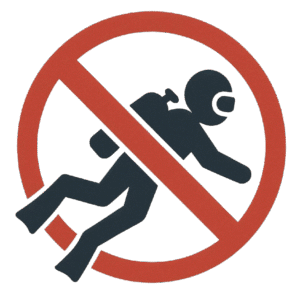Why Underwater Diver Inspections Aren’t Real Leak Detection in Freehold, NJ
In Freehold, NJ, the first call many pool owners make when they notice water loss is to a so‑called “pool leak diver.” Someone shows up with a mask, tank, and dye bottle, swims around for a little while, and then gives you an opinion. The problem is simple: underwater inspections alone are not real leak detection. They’re a small piece of the process, and when that’s all you get, the most important leaks around your pool are never even tested.
Why Freehold Homeowners Are Misled by Underwater “Inspections”
On the surface, hiring a diver sounds logical. Your pool is leaking water, so someone goes underwater to look at it. But in Monmouth County, most serious leaks are not visible from inside the pool. They’re in the pipes that run under your patio, the fittings behind your walls, or the joints buried under concrete.
When the only tool a contractor uses is an underwater visual check, they can only report what they see. If your vinyl liner looks good and they don’t see an obvious crack, you’ll often hear one of two “diagnoses”:
- “I didn’t see anything wrong.”
- “It’s probably in the plumbing somewhere.”
Neither of those statements is a real test result. They’re opinions. And in a place like Freehold – where many pools have long underground runs from the equipment pad to the pool – relying on opinion instead of testing is the fastest way to waste money.
What Underwater Divers in Freehold Can’t Possibly See
No matter how experienced a diver is, there are physical limits to what they can find. A mask and flashlight do not let them see through concrete, soil, or buried PVC. That means the most common leak points around Freehold pools are invisible to them, including:
- Underground return and skimmer lines running under your patio, driveway, or yard
- Fittings and joints inside walls or under the deck where plumbing changes direction
- Cracks beneath concrete collars and coping that only open when pressure builds in the system
- Multiple small leaks spread across more than one line or fitting
Many Freehold pools also have spas, waterfalls, and other features that add even more plumbing underground. An underwater look at the pool shell tells you almost nothing about what’s happening in those lines. So when you’re handed a “no leak found” verdict after a quick dive, it usually means: “We didn’t test anything we couldn’t see.”
That’s how homeowners end up replacing perfectly good vinyl liners, re‑tiling walls, or paying for unnecessary concrete cuts – all because the person they hired never pressure‑tested the plumbing in the first place.
Real Leak Detection in Freehold, NJ Starts Above the Water
Professional leak detection in Freehold doesn’t start with someone jumping in your pool. It starts with systematic testing. A proper inspection uses tools and methods designed to prove where your leak is – and where it is not – before anyone cuts concrete or replaces a liner.
A real leak detection process typically includes:
- Water loss testing – Measuring how much water you lose with the system running vs. off to determine whether the leak is likely in the plumbing or structure.
- Line isolation – Separating each line (skimmers, returns, main drains, spa, water features) so they can be tested individually instead of guessing.
- Pressure testing with air and water – Pressurizing lines and watching pressure gauges to see if they hold. A dropping gauge proves there is a leak.
- Electronic and acoustic locating – Using specialized listening equipment and electronic locators to track the exact spot where air and water are escaping underground.
This is how legitimate leak detection companies work. They provide you with test results, not just a diver’s opinion. When they recommend a repair – whether it’s a plumbing fix under the deck or a structural patch – they can show you how they know that’s where the leak is.
Why Freehold Pools Need More Than a Diver’s Opinion
Freehold’s climate and construction styles make certain leaks especially common. Winters bring freeze‑thaw cycles that shift soil and stress underground plumbing. Many backyards have large concrete patios or paver decks built after the pool went in, which means lines are now trapped under heavy hardscape.
If a leak under that hardscape is misdiagnosed, you can easily end up paying thousands for the wrong repair. Some of the most expensive mistakes we see in Freehold include:
- Replacing a vinyl liner because a diver “didn’t see anything,” when the real leak was in a return line under the deck
- Cutting random sections of concrete in search of a leak that proper electronic locating could have pinpointed within inches
- Accepting “no leak found” and letting a slow underground leak wash out soil, undermining the deck and equipment pad over time
These problems don’t happen because homeowners are careless. They happen because they trust that an underwater inspection is the same as professional leak detection. It isn’t.
Skip the Diver. Get Real Leak Detection in Freehold, NJ.
If your pool in Freehold is losing water and all you’ve gotten so far is a diver’s opinion, it’s time to move beyond underwater inspections. Real leak detection uses pressure testing, line isolation, and electronic locating to prove where your leak is before you pay for repairs.
Call [YOUR COMPANY NAME] at [YOUR PHONE NUMBER] or request a leak inspection online today. Don’t accept “I didn’t see anything” as a diagnosis. Get documented, test‑based leak detection you can trust.

